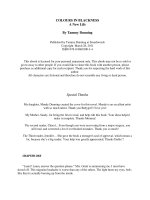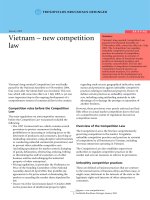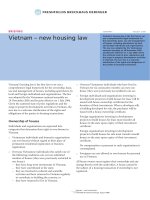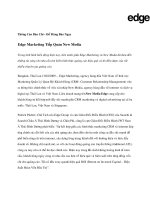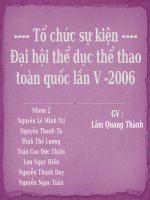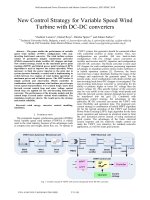AD Egypt New Act revised
Bạn đang xem bản rút gọn của tài liệu. Xem và tải ngay bản đầy đủ của tài liệu tại đây (83.44 KB, 31 trang )
WORLD TRADE
ORGANIZATION
G/ADP/N/1/EGY/2/Rev.1*
G/SCM/N/1/EGY/2/Rev.1*
G/SG/N/1/EGY/2
18 December 1998
(98-5095)
Committee on Anti-Dumping Practices
Committee on Subsidies and Countervailing Measures
Committee on Safeguards
Original: English
NOTIFICATION OF LAWS AND REGULATIONS
UNDER ARTICLES 18.5, 32.6 AND 12.6 OF THE AGREEMENTS
EGYPT
Revision
UNOFFICIAL TRANSLATION
Official Journal Issue No. 24 Supplement A - dated 11 June 1998
LAW NO. 161 OF THE YEAR 1998 CONCERNING THE PROTECTION
OF NATIONAL ECONOMY FROM THE EFFECTS OF INJURIOUS
PRACTICES IN INTERNATIONAL TRADE
ARTICLE 1
The Ministry of Trade and Supply shall be concerned with applying methods, procedures,
measures, and making the necessary decisions for the protection of the national economy
from the injury resulting from subsidies or dumping practices or the unjustifiable increase
in imports, in accordance with the relevant Agreements embodied in the Final Act of the
Uruguay Round of Multilateral Trade Negotiation to which the Arab Republic of Egypt
adhered to by virtue of the Decree of the President of the Republic No. 72 of the year
1995.
The Ministry shall be the Authority responsible for implementing the provisions of this
Law, and in so doing it shall undertake the following:
(A) Provide the studies, information and data necessary for establishing evidence of
subsidies or dumping, or unjustifiable increase in imports;
(B) Extend technical assistance to local producers facing a complaint from a Member of
the World Trade Organization, in the cases referred to in the previous paragraph.
ARTICLE 2
The Minister of Trade and Supply shall have the power to request the information and
data which are necessary for establishing cases of subsidies or dumping, or unjustifiable
increase in imports, from any entity whatsoever. The entity from which such information
and data are required shall submit them within at most thirty days from the date of the
request.
ARTICLE 3
The Minister of Trade and Supply shall make the necessary decisions concerning the
countervailing measures prescribed in the Agreements referred to in Article (1) of this
Law, to confront subsidies or dumping cases, or the unjustifiable increase in imports, in
accordance with the disciplines and within the limits prescribed in these Agreements.
ARTICLE 4
The Administrative Court shall have the exclusive jurisdiction to consider and examine
the disputes related to the implementation of the provisions of the previous Articles.
Appeals against the rulings pronounced by the Administrative Court shall be filed before
the High Administrative Court.
The settlement of these disputes and claims shall take place promptly and be effected in
accordance with the provisions comprised in the Agreements referred to in Article (1) of
this Law.
ARTICLE 5
A list of experts in the areas of specialization necessary for the implementation of the
Agreements referred to in Article (1) of this Law shall be compiled by the Ministry of
Justice. Inclusion in this list shall be done according to the terms and conditions to be
issued by virtue of a decision to be issued by the Minister of Justice in agreement with
the Minister of Trade and Supply.
The Court shall determine expert fees according to the provisions of the executive
regulations. It shall also determine the party that is bound to incur these fees.
ARTICLE 6
All persons or entities concerned with investigating the complaints related to subsidies or
dumping cases, or the unjustifiable increase in imports and also with implementing the
relevant procedures, measures and decisions, as well as examining the complaints shall
maintain the confidentiality of the information and data which are given and provided by
the concerned parties according to the provisions prescribed in this Law and in its
executive regulations, and those comprised in the Agreements referred to in Article (1) of
this Law.
It shall be prohibited to disclose the information and data referred to above, except by
virtue of an explicit written permission from the party that provided it.
ARTICLE 7
Without prejudice to more stringent penalties prescribed by law, violating the prohibition
prescribed in the previous article shall be liable to penalizing with a fine of not less than
ten thousand pounds and not exceeding fifty thousand pounds.
ARTICLE 8
The Minister of Justice in agreement with the Minister of Trade and Supply shall issue a
decision defining those who are vested with the authority of investigating the crimes
committed in violation of the provisions of this Law and its executive regulations.
ARTICLE 9
Article (8) of the Customs Law as promulgated by Law No. (66) of the year 1963 shall be
abrogated. Any provision that contradicts the provisions of this Law shall also be
abrogated.
ARTICLE 10
The Minister of Trade and Supply shall issue the executive regulations of this Law and
the decisions necessary for its implementation within a period of three months from the
date of its entry into force.
ARTICLE 11
This Law shall be published in the Official Journal and shall enter into force as of the day
following the date of its publication.
THIS LAW SHALL BE STAMPED WITH THE SEAL OF THE STATE AND
ENFORCED AS ONE OF ITS LAWS.
ISSUED AT THE PRESIDENCY OF THE REPUBLIC ON 16 SAFAR HEJIRA YEAR
1419 (11 JUNE 1998).
IMPLEMENTING REGULATIONS OF THE EGYPTIAN LAW NO. 161
CONCERNING THE PROTECTION OF THE NATIONAL
ECONOMY FROM INJURIOUS EFFECTS OF UNFAIR
PRACTICES IN INTERNATIONAL LAW
TABLE OF CONTENTS
Page
PART I - DEFINITIONS AND GENERAL PROVISIONS 6
Section 1 - Definitions 6
Section 2 - General Provisions 7
PART II - APPLICATION AND PROCEDURES OF INVESTIGATION 9
Section 1 - The Application 9
Section 2 - Investigation Procedures 11
PART III - ANTI-DUMPING 13
Section 1 - Dumping Calculations 13
Section 2 - Determination of Injury 14
Section 3 - Provisional Measures 16
Section 4 - Definitive Anti-Dumping Duties 16
Section 5 - Undertakings 17
Section 6 - Retroactivity 18
Section 7 - Review of Definitive Anti-Dumping Duties 18
PART IV - SUBSIDY AND COUNTERVAILING MEASURES 19
Section 1 - Definition of Subsidy 19
Section 2 - Consultations 19
Section 3 - Subsidy Calculations 20
Section 4 - Determination of Injury 21
Section 5 - Provisional Measures 22
Section 6 - Definitive Countervailing Duties 22
Section 7 - Undertakings 23
Section 8 - Retroactivity 24
Section 9 - Review of Definitive Countervailing Duties 24
PART V - SAFEGUARD MEASURES AGAINST THE UNJUSTIFIABLE INCREASE
IN IMPORTS 25
Section 1 - Application of Safeguard Measures 25
Section 2 - Determination of Serious Injury or Threat Thereof 25
Section 3 - Provisional Safeguard Measures 26
Section 4 - Definitive Measures 26
PART IV - FINAL PROVISIONS 27
REGULATION OF LAW NO. 161/1998 CONCERNING THE
PROTECTION OF NATIONAL ECONOMY FROM INJURIOUS
EFFECTS OF UNFAIR PRACTICES IN INTERNATIONAL TRADE
PART I: "DEFINITIONS AND GENERAL PROVISIONS"
Section 1: "Definitions"
Article 1
In applying the provisions of this regulation, the following terms shall be defined as
follows:
- "Final Act" means the Act including the Results of the Multilateral Trade Negotiations
of the Uruguay Round.
- "WTO Agreement" means the Marrakesh Agreement Establishing the World Trade
Organization concluded in Marrakesh, Morocco, on 15 April 1994.
- "Anti-Dumping Agreement" means the Agreement included in Annex (1A) to the Final
Act of the Results of the Uruguay Round concerning the Implementation of Article VI of
GATT 1994 and regulating the imposition of anti-dumping duties against dumped imports
causing material injury to the domestic industry or threat thereof.
- "Agreement on Subsidies and Countervailing Measures" means the Agreement included
in Annex (1A) to the Final Act of the Results of the Uruguay Round concerning the
Implementation of Article XVI of GATT 1994 and regulating the imposition of
countervailing duties against countries which provide subsidies for the goods exported
from them and thereby causing injury to the domestic industry or threat thereof.
- "Agreement on Safeguards" means the Agreement included in Annex (1A) to the Final
Act of the Results of the Uruguay Round concerning the Implementation of Article 19 of
GATT 1994, regulating the imposition of safeguard measures against increased imports
causing serious injury to the domestic industry or threat thereof.
- "Injurious Practices" means the increase of imports of a product as a result of dumping
or subsidy which causes material injury to the domestic industry or threat thereof, or the
unjustifiable increase of imports which causes serious injury to the domestic industry or
threat thereof.
- "Concerned parties" shall include the domestic industry (the applicant), those acting on
behalf of the domestic industry, importers, exporters and governments of exporting
countries.
- "Other interested parties" means industrial users of the product under investigation,
consumer associations, government bodies responsible for consumer protection,
government bodies responsible for making competition policies or any other foreign or
domestic parties found to have an interest.
- "Domestic Industry" means the Egyptian producers of the like product whose collective
output represents a major proportion of the domestic production of that product. This
definition is applicable to both industrial and agricultural production.
- "Independent buyer" means a buyer who is in no way related to the importer; there is no
commercial or production partnership between the buyer and the importer, there is no
common relationship in another business, they are not directly or indirectly controlled by
a third party or members of the same family.
- "Government of an exporting country" means:
(a) The government of a foreign country;
(b) Any local or regional government or authority of a foreign country;
(c) A body that exercises authority for an association of foreign countries;
(d) A person, agency or institution acting for or on behalf of a government or body
referred to in (a) to (c) of this definition.
- "Members having substantial interest in supplying the product concerned" means those
Member states who export a significant proportion of the total imports of Egypt's imports
of the product under investigation.
- "The Investigating Authority" means The International Trade Policies Department
(Anti-Dumping, Subsidy and Safeguard Department), Foreign Trade Sector.
Section 2: General Provisions
Article 2
The Foreign Trade Sector, Ministry of Trade and Supply, shall be the competent authority
for implementing the provisions of Law No. 161/1998 referred to.
Article 3
An Advisory Committee shall be formed upon a decree by the Minister of Trade and
Supply to consider the results concluded by the Investigating Authority concerning the
injurious practices in international trade, so that the Committee can make
recommendations to the Minister of Trade and Supply.
This decree sets out the competencies, rules and work system of that Committee.
Article 4
Both the Head of the Foreign Trade Sector and the Head of the International Trade
Policies Department of the Ministry of Trade and Supply shall be authorized to ask for
the data required to prove the cases of subsidy, dumping or unjustifiable increase of
imports.
Article 5
In cases where the Administrative Court refers cases to a competent expert, a time-limit
shall be set to complete the task and expert fees shall not be less than three hundred
pounds per day.
Article 6
Notifications to interested parties, letters to complete documents or to ask for comments
shall be sent by a registered mail, courier service, which confirms delivery to the
interested party personally or to his legal deputy.
The above-mentioned procedures shall be taken in all correspondence with the parties
concerned in foreign countries through their diplomatic missions or authorized consuls in
the Arab Republic of Egypt.
Article 7
The Investigating Authority shall prepare a detailed report including information and
explanations concerning all notifications. This report shall be available to all parties
concerned.
- "Concerned parties" shall include the domestic industry (the applicant), those acting on
behalf of the domestic industry, importers, exporters and governments of exporting
countries.
- "Other interested parties" means industrial users of the product under investigation,
consumer associations, government bodies responsible for consumer protection,
government bodies responsible for making competition policies or any other foreign or
domestic parties found to have an interest.
- "Domestic Industry" means the Egyptian producers of the like product whose collective
output represents a major proportion of the domestic production of that product. This
definition is applicable to both industrial and agricultural production.
- "Independent buyer" means a buyer who is in no way related to the importer; there is no
commercial or production partnership between the buyer and the importer, there is no
common relationship in another business, they are not directly or indirectly controlled by
a third party or members of the same family.
"Government of an exporting country" means:
(a) The government of a foreign country;
(b) Any local or regional government or authority of a foreign country;
(c) A body that exercises authority for an association of foreign countries;
(d) A person, agency or institution acting for or on behalf of a government or body
referred to in (a) to (c) of this definition.
- "Members having substantial interest in supplying the product concerned" means those
Member states who export a significant proportion of the total imports of Egypt's imports
of the product under investigation.
- "The Investigating Authority" means The International Trade Policies Department
(Anti-Dumping, Subsidy and Safeguard Department), Foreign Trade Sector.
Article 8
The Investigating Authority shall require interested parties providing confidential
information to furnish non-confidential summaries thereof. These summaries shall be in
sufficient detail to permit a reasonable understanding of the substance of the information
submitted in confidence. Those parties may indicate that such information is not
susceptible of summary. In this case a statement of the reasons why summarization is not
possible must be provided.
The Investigating Authority may disregard data and information provided if
confidentiality is not justified or the request for confidentiality is not warranted.
Article 9
All persons and bodies shall be required to protect the confidentiality of information and
data in cases where it is necessary for the purpose of investigation or appeal, to have
access to such information.
Article 10
Rejection of an application, initiation or termination of investigation, provisional or
definitive measures or acceptance of a price undertaking or any other measures shall be
upon a decision by the Minister of Trade and Supply and upon a recommendation by the
Advisory Committee mentioned in Article 3 of this regulation.
Article 11
The Investigating Authority shall be required to complete the investigation within 12
months from the date of initiation. The Minister of Trade and Supply may extend this
period, upon recommendation by the advisory committee referred to, for another period
of no more than six months.
Article 12
Procedures, measures and duties applied in accordance with this regulation shall be
applicable to imported goods for which a custom statement has been made for final
clearance.
PART II: "APPLICATION AND PROCEDURES OF INVESTIGATION"
Section 1: "The Application"
Article 13
A written application of the effects caused by subsidy, dumping or an unjustifiable
increase of imports shall be submitted to the Investigating Authority in the form provided
for this. The applicant shall attach a non-confidential summary to the application, in
sufficient detail to permit a reasonable understanding of the substance of the information
submitted in confidence.
Article 14
The application shall be accepted only if it is lodged by or on behalf of the domestic
industry, chamber of the industries concerned, federation of industries, producers
associations or the ministries supervising any of the production sectors.
The application shall include evidence of the existence of dumping, subsidy or an
unjustifiable increase of imports, the injury caused by each and the causal link between
each and the injury caused or threatened to the applicant.
Article 15
In applications where the domestic industry alleges that dumped or subsidized imports
have materially retarded the establishment of a new industry, the applicant should
provide:
1. Whether the domestic industry of the like product has already been established and the
time required to establish this industry if it hasn't been established yet.
2. Possibilities of continuing this industry.
3. Feasibility studies.
4. Negotiated loans.
5. Contracts concluded to purchase new machinery to implement new investment or to
expand the existing factories.
Article 16
The Investigating Authority should inform the applicant, within seven working days from
the date of receiving the application, whether the application has been accepted in
principle. The Investigating Authority may ask the applicant to provide information
required to consider the acceptance of the application. The application shall be registered
promptly after acceptance.
Article 17
The Investigating Authority shall examine the accuracy and adequacy of the evidence
provided within thirty days from the date of registering the application. The Investigating
Authority shall submit a preliminary report to the Advisory Committee showing the
results of considering whether to reject the application or to initiate an investigation. This
Committee shall present its recommendations to the Minister of Trade and Supply within
ten days from the date of receiving this report.
Article 18
The Investigating Authority shall notify the applicant of the reasons why the application
was rejected within no more than seven days of the Ministerial determination.
Section 2: "Investigation Procedures"
Article 19
An investigation shall not be initiated unless the application is supported by those
domestic producers whose collective output constitutes more than 50 per cent of the total
production of the like product produced by that portion of the domestic industry
expressing either support for or opposition to the application. However, no investigation
shall be initiated when domestic producers expressly supporting the application account
for less than 25 per cent of total production of the like product produced by the domestic
industry.
Article 20
The Investigating Authority may, after presenting the report to the Advisory Committee
and after approval of the Minister, initiate an investigation without having received a
written application by or on behalf of the domestic industry for the initiation of such
investigation only if they have sufficient evidence of dumping, subsidy or unjustifiable
increase of imports, injury and a causal link to justify the initiation of an investigation.
Article 21
The Investigating Authority shall notify the governments of the countries concerned with
the applications already accepted before proceeding to initiate an investigation, except in
respect of safeguard applications.
Article 22
The Investigating Authority shall publish the notice of the initiation of an investigation in
the Official Gazette. The notice shall include:
1. Names of the countries of origin or export of the product under investigation.
2. A description of the product in question.
3. A description of the allegations and practices under investigation.
4. A summary of the basis for alleged injury.
5. Time limits for other parties concerned to reply.
6. The address the interested parties should send their replies to.
Article 23
The Investigating Authority shall send all known interested parties and the
representatives of the exporting countries a copy of the non-confidential version of the
application, the notice of initiation and questionnaires to get the data necessary for the
investigation. The parties concerned should send their responses within 37 days from the
date of receiving the questionnaires. This period may be extended upon good cause
accepted by the Investigating Authority.
Article 24
In cases where the number of the parties concerned or the types of products involved is so
large as to make such investigation impracticable, the Investigating Authority may limit
their investigation to a representative sample of the parties or types of products involved.
Article 25
The Investigating Authority shall provide fair opportunities for all parties concerned to
defend their interests during the period of investigation and may, upon request, hold
hearings for the interested parties to present their views and arguments. All interested
parties can present verbal information during the hearings, however, this information
shall not be taken into consideration unless it is provided in writing later on.
Article 26
The Investigating Authority may conduct on-the-spot verification visits inside and outside
the country to obtain the information and data required for the investigation provided
they obtain the approval of the parties concerned.
Article 27
In case of absence of the data required, failure to submit data within the time-limit or
non-cooperation with the Investigating Authority, the Investigating Authority may
proceed in the investigation procedures and come to conclusions according to the best
information available.
Article 28
Investigation procedures shall not prevent clearance of consignments of the subject goods
from customs.
Article 29
Subject to the requirement to protect confidential information, the Investigating Authority
shall make available all information and data, relevant to the investigation, to all the
parties concerned. The Investigating Authority shall disclose the confidential information
to the court or the expert it appoints upon written permission from the party providing
such information.
Article 30
The investigation shall be terminated if the Investigating Authority finds insufficient
evidence of injurious practices, injury or causal link between both.
Article 31
The Investigating Authority shall, where conditions of an injurious practice in
international trade are met, prepare a report of the conclusions reached in the
investigation within three months from the date of the notice of initiation.
PART III: "ANTI-DUMPING"
Section 1: "Dumping Calculations"
Article 32
- Dumping is the introduction of a product into Egypt at an export price which is less than
its normal value in the ordinary course of trade.
- Export price shall be the price paid or payable by the importer other than any part of the
price that represents:
(i) Costs, charges, and expenses incurred in preparing the goods for shipment to Egypt
that are additional to those costs, charges, and expenses generally incurred on sales for
home consumption; and
(ii) Any other costs, charges, and expenses resulting from the exportation of the goods or
arising from their shipment from the country of export.
- Normal value shall be the price paid for the like goods in the ordinary course of trade
for home consumption in the country of origin/export or the cost of production plus the
selling, general and administrative costs in addition to the amount of profit normally
realized on sales of goods or the price at which the like product is exported to a third
country.
The Investigating Authority may construct the normal value for goods originating in or
exported from a state-economy country or on the basis of the data of a free-economy
country with similar conditions or on any other basis it deems appropriate.
Article 33
In cases where there is no export price for the product concerned or where it appears to
the Investigating Authority that the export price is unreliable because of association,
relationship or a compensatory agreement between exporter and the importer or a third
party, the export price may be calculated on the basis of the selling price to the first
independent buyer in the domestic market or any other basis the authority deems
appropriate.
Article 34
The normal value shall be constructed according to the cost of production in the country
of origin plus an appropriate amount for selling, general and administrative costs and a
reasonable margin of profit, or according to the export price of the goods to a third
country in the following cases:
1. Where there are no sales in the domestic market of the country of export or where
domestic sales are made at a loss.
2. Where domestic sales of the subject goods account for less than 5 per cent of the
export sales to Egypt.
Article 35
In cases where there is insufficient data to determine the export price or the normal value,
the Investigating Authority may determine them on the basis of the best information
available.
Article 36
The margin of dumping is the difference between the normal value and the export price.
In calculating the margin of dumping, the Investigating Authority shall make the
calculations on the same level of trade for as nearly as possible the same period, taking
into consideration the factors which affect price comparability pursuant to the provisions
of Article 2.4 of the Anti-Dumping Agreement.
Article 37
The Investigating Authority shall calculate a separate margin of dumping for each
exporter. The highest margin of dumping shall be imposed on the unknown or noncooperative exporters.
If the number of exporters is large, the Investigating Authority may limit the investigation
to a representative sample in which case the margin of dumping shall be applied as
follows:
1. Individual margins of dumping or the weighted average of these margins shall be
applied to the representative sample of exporters.
2. The weighted average of the dumping margins calculated for the representative sample
of exporters shall be applied to the cooperative exporters not included in the sample.
3. The highest dumping margin shall be applied to the unknown or non-cooperative
exporters.
Article 38
The Investigating Authority shall prepare a report to recommend the termination of the
investigation in the following cases:
(a) If the volume of dumped imports from a particular country is less than 3 per cent of
the volume of imports of the subject goods unless countries which individually account
for less than 3 per cent of the total imports of the like product collectively account for
more than 7 per cent of the total imports.
(b) If the margin of dumping is less than 2 per cent of the export price.
Section 2: "Determination of Injury"
Article 39
The Investigating Authority, having examined all positive evidence, shall determine the
material injury suffered by the domestic industry and shall verify the following:
1. Existence of significant increase in dumped imports, either in absolute terms or relative
to production or consumption in Egypt. With regard to the effect of the dumped imports
on prices the authority shall consider:
(a) Whether there has been a significant price undercutting by the dumped imports as
compared with the price of the domestic like product.
(b) Whether the effect of such imports is to depress prices of the like product to a
significant degree, or
(c) Whether the effect of such imports is to prevent price increases which otherwise
would have occurred.
2. The economic effects of the dumped imports on the domestic industry reflected in the
following:
(a) Actual and potential decline in sales, profits, production, market share, productivity,
return on investment or utilization of capacity.
(b) Factors affecting domestic prices.
(c) Magnitude of the margin of dumping.
(d) Actual and potential negative effects on cash flow, inventories, employment, wages,
investment, growth and ability to raise capital.
(e) Any other factors the Investigating Authority deem to be significant.
Article 40
Subject to the provisions of Article 39 of this regulation, in determining the threat of
injury to the domestic industry, the Investigating Authority shall verify that the threat of
injury is clear and imminent and shall consider the following:
1. The rate of increase of the dumped imports.
2. Likelihood of significant increase in dumped imports into Egypt in the light of
contracts (future purchase orders).
3. Whether imports are entering at prices that will have a significant depressing or
suppressing effect on domestic prices, and would likely increase demand for further
imports.
4. The existence of significant export capacity or inventories of the product in question in
the exporting companies.
5. Any other factors which the Investigating Authority determines to have an economic
effect on the industry.
Article 41
The Investigating Authority shall verify that the injury suffered by the industry is caused
by the dumped imports and not due to any other causes.
Article 42
The Investigating Authority shall, on receiving an application of dumped imports that led
to materially retard a new industry, evaluate the contents of the application and prepare a
report with their recommendations on it.
Article 43
Where imports of a product from more than one country are simultaneously subject to
anti-dumping investigations, the Investigating Authority may cumulatively assess the
effects of such imports only if they determine that:
1. The margin of dumping established in relation to the imports from each country is 2
per cent or more of the export price.
2. The volume of imports from each country is 3 per cent or more of the total volume of
imports of the like product into Egypt.
3. The existence of competition among the imported products and between the imported
products and the like domestic products.
Section 3: "Provisional Measures"
Article 44
Provisional measures may take the form of a cash deposit which is not greater than the
provisionally estimated margin of dumping. Such provisional measures shall not be
applied sooner than 60 days from the date of initiation of the investigation and a
conclusion is made by the Investigating Authority that there exists dumping which caused
injury to the domestic industry.
Provisional measures shall be applied for a period not exceeding four months, which may
be extended to six months.
If the provisional measures are less than the margin of dumping, they shall be applied for
six months which may be extended to nine months.
Section 4: "Definitive Anti-Dumping Duties"
Article 45
The Investigating Authority shall determine the amount of definitive anti-dumping duties,
which will not exceed the margin of dumping.
Such duties shall be imposed on dumped imports of the product from all sources found to
be causing material injury to the domestic industry, except for imports from those sources
from which price undertakings have been accepted.
Article 46
Definitive anti-dumping duties shall be imposed for a period which will not exceed five
years from the date of publishing the final determination of imposition in the Official
Gazette.
Article 47
In cases where products subject to definitive anti-dumping duties are exported to Egypt
by exporters or producers who have not exported the product to Egypt during the period
of investigation, the authority shall promptly carry out a review for the purpose of
determining individual margins of dumping for each of them provided that they can show
that they are not related to any of the exporters or producers referred to during the course
of the review.
In these cases the Investigating Authority may request guarantees that are equal to the
definitive anti-dumping duties imposed on other exporters from the date of initiating the
review.
Section 5: "Undertakings"
Article 48
Exporters may offer to the Investigating Authority voluntary undertakings to increase the
price of their exports to Egypt. Price increases under such undertakings shall not be
higher than necessary to eliminate the margin of dumping established by the Investigating
Authority.
In accepting, rejecting or amending undertakings the following issues shall be taken into
consideration:
1. The possibility to suspend or terminate proceedings, if such undertakings are accepted
and if the Investigating Authority finds these undertakings sufficient to eliminate the
margin of dumping unless the exporters ask to continue the investigation.
2. Informing the exporters in case of rejection and the reasons for that rejection if
practicable.
3. The Investigating Authority may also require any exporter from whom an undertaking
has been accepted to periodically provide information relevant to the fulfilment of such
an undertaking and to permit verification of pertinent data.
Article 49
Subject to the provisions of section 7 of this part, price undertakings shall be maintained
for a reasonable period of time sufficient to eliminate the margin of dumping.
Undertakings shall automatically lapse if a decision was taken to terminate the
investigation as there is no evidence of dumping or no injury was caused to the domestic
industry.
Article 50
In case of violation of an undertaking the Investigating Authority may prepare a report to
impose a provisional duty using the best available information or impose definitive
duties. In such cases, definitive duties may be levied retroactively on the products which
entered on the date of violation of the price undertaking and not more than 90 days before
the application of such provisional measures.
Section 6: "Retroactivity"
Article 51
Where a final determination of injury or threat thereof is made, anti-dumping duties may
be levied retroactively for the period for which provisional measures have been applied.
Article 52
If the definitive anti-dumping duty is higher than the provisional duty paid, the difference
shall not be collected. However, if the definitive duty is lower than the provisional duty
paid, the difference shall be reimbursed.
Article 53
Where a determination of threat of injury or material retardation is made (but no injury
has yet occurred) a definitive anti-dumping duty shall not be imposed retroactively.
Article 54
A definitive anti-dumping duty may be levied on products which were entered for
consumption not more than 90 days prior to the date of application of provisional
measures, when the Investigating Authority determines that:
(a) There is a history of dumping which caused injury or that the importer was aware or
should have been aware that the exporter practiced dumping and that such dumping
would cause injury, and
(b) The injury is caused by increased dumped imports of a product in a relatively short
time which is likely to seriously undermine the remedial effect of the definitive antidumping duty to be applied, provided that the importers concerned have been given an
opportunity to comment.
Section 7: "Review of Definitive Anti-Dumping Duties"
Article 55
The Investigating Authority may, after one year from the date of imposition of definitive
anti-dumping measures, review the need for the continued imposition of the duty, where
warranted, upon request by any interested party which submits positive information
substantiating the need for a review.
If, as a result of the review, the Investigating Authority determines that the definitive antidumping duty is no longer warranted it shall be terminated immediately.
If, as a result of the review, there is a need to impose definitive duties, they may be
imposed for no more than five years from the date of the most recent review.
The Investigating Authority may, at any time, carry out a review on its initiative if
necessary.
Article 56
The Investigating Authority shall carry out a review on its initiative or upon request by a
concerned party, six months before the expiry of the five-year period from the date of the
imposition of definitive duties. The Investigating Authority shall review whether the
expiry of the duty is likely to lead to continuation or recurrence of dumping and injury.
The duty shall remain in force pending the outcome of such a review.
Any such review shall be concluded within 12 months of the date of the initiation of the
review.
PART IV: "SUBSIDY AND COUNTERVAILING MEASURES"
Section 1: "Definition of Subsidy"
Article 57
Subsidy is any financial contribution provided directly or indirectly, by the government
of the country of origin or any public body within its territory and a benefit is thereby
conferred to the recipient of subsidy either producer(s) or exporter(s).
Subsidy includes any financial or other commercial benefit that has occurred or will
accrue, directly or indirectly, to persons engaged in the production, manufacture, or trade
of goods as a result of any scheme, programme, practice, or thing done, provided, or
implemented by a foreign government, but does not include the amount of any duty or
internal tax imposed on goods by the Government of the country of origin or country of
export from which the goods, because of their exportation from the country of export or
country of origin, have been exempted or will be relieved by means of refund or
drawback.
Measures can be taken against subsidy only if it confers a benefit on the recipient, is
directed or specific to certain enterprises or industries and causes material injury or threat
thereof to the domestic industry or materially retards the establishment of a new industry.
Section 2: "Consultations"
Article 58
Upon acceptance of an application, the Investigating Authority shall take necessary
measures to invite the governments of the exporting countries of the subsidized products
under consideration to conduct consultations with the purpose of reaching mutually
accepted solutions.
The Investigating Authority shall give the opportunity, as well, in the course of
investigations, to conduct the above-mentioned consultations.
Conduct of consultations shall not prevent the initiation or completion of investigation.
Section 3: "Subsidy Calculations"
Article 59
The amount of subsidy is the amount of money which represents the benefit conferred on
the recipient. Investigating Authority shall calculate the amount of subsidy according to
the following rules:
1. Determining the total amount of the subsidy provided to the products under
investigating during the period of investigation.
2. A weighted average shall be used if the amount of the subsidy varies among the
exporters of the country providing a subsidy.
3. Expenses and charges spent to get the subsidy shall be deducted from the amount of a
subsidy.
4. The amount of the subsidy shall be calculated on a unit basis and as a percentage of the
value of this unit.
5. The amount of the subsidy does not include:
(a) the provision of equity capital by a foreign government unless the investment decision
in relation to the provision of that equity can be regarded as inconsistent with the usual
investment practice of private investors in the territory of the exporting country;
(b) the provision of a loan by a foreign government unless the amount that the recipient
of the loan pays under the loan is less than the amount that the recipient would pay under
a comparable commercial loan that the recipient would obtain on the market, in which
case, the benefit to the recipient shall be deemed to be the difference between those two
amounts;
(c) the provision of a loan guarantee by a foreign government unless the amount that the
recipient of the loan pays under the government guaranteed loan is less than the amount
that the recipient would pay under a comparable commercial loan that was not so
guaranteed, in which case, the benefit of the recipient shall be deemed to be the
difference between those two amounts.
The Investigating Authority shall establish the amount of the subsidy according to the
reliable available data if it does not have sufficient data to verify the amount of the
subsidy.
Article 60
The Investigating Authority shall prepare a report recommending the termination of an
investigation if it is found that the amount of the subsidy is less than 1 per cent of the
value of subsidized goods; or where the imposition of a countervailing duty on the
subject goods is inconsistent with Egypt's obligations under GATT 1994.
Section 4: "Determination of Injury"
Article 61
The Investigating Authority, having examined all positive evidence, shall determine the
material injury suffered by the domestic industry and shall verify the following:
1. Existence of significant increase in subsidized imports, either in absolute terms or
relative to production or consumption in Egypt. With regard to the effect of the
subsidized imports on prices the authority shall consider:
(a) Whether there has been a significant price undercutting by the subsidized imports as
compared with the price of the domestic like product;
(b) whether the effect of such imports is to depress prices of the like product to a
significant degree; or
(c) whether the effect of such imports is to prevent price increases which otherwise would
have occurred.
2. The economic effects of the subsidized imports on the domestic industry reflected the
following:
(a) Actual and potential decline in sales, profits, production, market share, productivity,
return on investment or utilization of capacity.
(b) Factors affecting domestic prices.
(c) Actual and potential negative effects on cash flow, inventories, employment, wages,
investment, growth and ability to raise capital.
(d) The increase of burden on government subsidy programmes for agricultural goods.
(e) Any other factors the Investigating Authority deems to be significant.
Article 62
Subject to the provision of Article (61) of this regulation, in determining the threat of
injury to the domestic industry, the Investigating Authority shall verify that the threat of
injury is clear and imminent and shall consider the following:
1. The rate of increase of the subsidized imports.
2. The likelihood of significant increase in subsidized imports into Egypt in the light of
contracts (future purchase orders).
3. Whether imports are entering at prices that will have a significant depressing or
suppressing effect on domestic prices, and would likely increase demand for further
imports.
4. The existence of significant export capacity or inventories of the product in question in
the exporting companies.
5. Any other factors which the Investigating Authority determines has an economic effect
on the industry.
Article 63
The Investigating Authority shall verify the injury suffered by the industry is caused by
the subsidized imports and not as a result of any other causes.
Article 64
The Investigating Authority shall, on receiving an application of subsidized imports
which led to materially retard a new industry, evaluate the contents of the application and
prepare a report with their recommendations on it.
Article 65
Where imports of a product from more than one country are simultaneously subject to
subsidy investigations, the Investigating Authority may cumulatively assess the effects of
such imports only if they determine that:
1. The amount of subsidy established for each unit of the product under investigation is 1
per cent or more.
2. The existence of competition among the imported products and between the imported
products and the like domestic products.
Section 5: "Provisional Measures"
Article 66
Provisional measures may take the form of a cash deposit which is not greater than the
amount of subsidy. Such provisional measures shall not be applied sooner than 60 days
from the date of initiation of investigation and a preliminary conclusion is made by the
Investigating Authority that there exists subsidy which caused injury to the domestic
industry.
The application of provisional measures shall be limited to a period not exceeding four
months.
Section 6: "Definitive Countervailing Duties"
Article 67
The Investigating Authority shall determine the amount of definitive duties. This amount
of definitive duties should not exceed the amount of the subsidy calculated for each unit
under investigation.
These duties shall be imposed on the subsidized imports from all sources if it is found
that they cause injury to the domestic industry. Duties will not be imposed on all
countries subject to the investigation which eliminated the subsidy under investigation or
those whose undertakings were accepted.
Article 68
Definitive countervailing duties shall be imposed for a period not exceeding 5 years
starting from the date of publishing the notice of imposition in the Official Gazette.
Article 69
If the products subject to definitive countervailing duties are imported into Egypt by
producers or exporters, not included in the proceedings for reasons other than noncooperation with the Investigating Authority, they may ask for an expeditious review to
evaluate their countervailing duties.
Section 7: "Undertakings"
Article 70
Governments of the exporting countries or exporters, provided they get the approval of
their governments, may offer to the Investigating Authority voluntary undertakings to
increase the price of their exports to Egypt. Price increases under such undertakings shall
not be higher than necessary to eliminate the margin of dumping established by the
Investigating Authority.
In accepting, rejecting or amending undertakings the following issues shall be taken into
consideration:
1. The possibility to suspend or terminate proceedings, if such undertakings are accepted
and if the Investigating Authority finds these undertakings sufficient to eliminate the
margin of dumping unless the exporters ask to continue the investigation.
2. Informing the exporters in case of rejection and the reasons for that rejection if
practicable.
3. The Investigating Authority may also require exporters or governments from which
undertakings have been accepted to periodically provide information relevant to the
fulfilment of such undertakings and to permit verification of pertinent data.
Article 71
Subject to the provisions of section 9 of this part, price undertakings shall be maintained
for a reasonable period of time sufficient to eliminate the amount of subsidy.
The undertaking shall automatically lapse if a decision was taken to terminate the
investigation where there is no evidence of subsidization or material injury to the
domestic industry.
Article 72
In case of violation of an undertaking the Investigating Authority may prepare a report to
impose a provisional duty using the best available information or impose definitive
countervailing duties. In such cases, definitive duties may be levied retroactively on the
products which entered on the date of violation of the price undertaking and not more
than 90 days before the application of such provisional measures.
